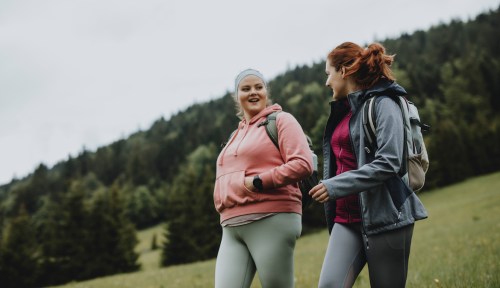Exercise Can Actually *Help* Calm Seasonal Allergies. Here’s How To Work Out When Pollen Counts Rise, According to an Allergist
Although some people try not to exercise with allergies, working out can actually help calm symptoms with the right approach.

Spring is in the air, pollen counts are up, and many people have been pushed right off of the workout wagon. Why exercise when you fear it might make your already miserable allergies worse, right?
Experts in This Article
Mark Murray, MD, is an allergist at the Mississippi Asthma and Allergy Clinic.
Believe it or not, it’s possible that a good workout might actually help decrease your symptoms. One study—albeit with a small sample size of just 27 patients—found that those who did 30 minutes of cardio three times a week for eight weeks showed significant improvement in certain markers. According to Mark Murray, MD, an allergist at the Mississippi Asthma and Allergy Clinic, it comes down to being strategic about your workouts so they don’t inflame your allergies.
Choose your workout wisely
Minimizing the impact of your allergy symptoms while exercising begins with choosing the right workout. Some types of exercise (especially high-impact workouts like HIIT or kickboxing) cause you to breathe harder and can exacerbate symptoms. Consider slower-paced alternatives, like yoga or strength-training, instead.
Try this yoga workout when your allergy symptoms have you feeling less than your best:
If your allergens can be found outside, Dr. Murray says you might opt for indoor options like a dance class or Pilates. But he adds that there are allergy benefits to outdoor exercise, too. “Sunlight exposure increases vitamin D production, which is important for regulating immune function and inflammation,” he says. “Find what makes you happy.”
Go early or late
If you’re intent on an outdoor sweat sess, consider setting an early alarm, or waiting until as late as you can. According to Dr. Murray, outside allergens typically increase during the day and decrease at night. “This would make the early morning or late evening the best times to exercise if you are trying to minimize your pollen exposure,” he says.
Track the weather
Set yourself up for success by watching your weather app: Dr. Murray says there is an increase of allergens in the atmosphere ahead of thunderstorms, followed by a brief “wash out” period in which pollen has been knocked out of the air. Dry or windy weather can also make your symptoms worse.
Premedicate
If you know you’re going to participate in a workout that will expose you to allergens (a hike, for example), you can get a headstart on your symptoms by taking your medication a couple hours beforehand.
Some doctors may even recommend pre-treating during the weeks leading up to allergy season, though Dr. Murray is less certain. “Over-the-counter antihistamines work fairly quickly so weeks of pretreatment may not be necessary,” he says. And because pollen seasons are variable, he believes it would be difficult to time treatment accordingly.
Though antihistamines are generally safe and well-tolerated, Dr. Murray says it’s worth talking with your physician before starting anything new, especially if you are taking other medications or have other conditions. “Seeing an allergist and getting tested can pinpoint particular triggers and help fine-tune the treatment regimen.”
Wash off quickly
After exercising during allergy season, you’re likely to have pollen on your body and clothes. Dr. Murray recommends showering directly after your workout so you can remove the pollen from your body. You may also want to throw your clothes into the washer, and do a sinus rinse with nasal saline to help flush out any leftover particles.
Most importantly, don’t give up on doing what you love just because it’s allergy season. With the right approach, you can have your workout and breathe easy, too.
Sign Up for Our Daily Newsletter
Get all the latest in wellness, trends, food, fitness, beauty, and more delivered right to your inbox.
Got it, you've been added to our email list.










